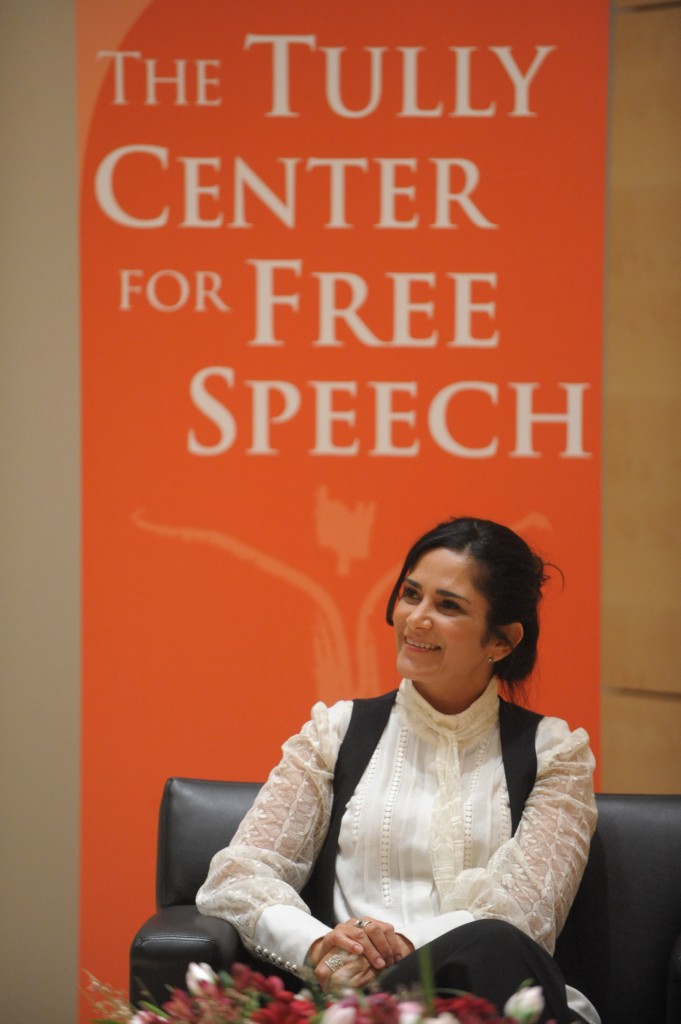Mexican journalist and human rights activist Lydia Cacho receives Tully Free Speech Award

When her written words were answered with death threats, and even after she was abducted, tortured and jailed, Lydia Cacho didn’t back down. And she still believes investigative journalism can change the world.
The Mexican journalist and human rights activist accepted the 2010 Tully Free Speech Award from the Newhouse School’s Tully Center for Free Speech Tuesday night, February 16, in the Joyce Hergenhan Auditorium. The award is given annually to a journalist who has faced and overcome obstacles to free speech.
Cacho, who was born in Mexico City, is an award-winning journalist, author and advocate. “You can say I was an activist since I was a teenager,” Cacho says, “I grew up being very involved with the community.”
After moving to Cancun as a young adult, intent on becoming a poet, Cacho became aware of her new community. “I saw the poverty and the contrast to the rich,” she says, “I got involved immediately, especially with the women and children. The government had a lack of interest in their lives.”
For the next 20 years, Cacho worked as an investigative journalist for Mexico City’s El Universal, writing about women and children’s rights.
In 2005, Cacho was illegally arrested, detained, harassed and tortured after the publication of her book, Los Demonios del Eden: El Poder Que Protege a la Pornografía Infantil (The Demons of Eden: The Power That Protects Child Pornography). The book exposes a Mexican child pornography ring operating with protection from Mexican politicians and businessmen.
The wealthy and powerful men behind the porn ring fought back against Cacho’s book. She says she received her first death threat after talking about what she knew on a television show. The ring leader told her, “If you’re going to mess with my personal life, I’m going to kill you.”
Cacho’s response to that was to tell more and more people about the children’s exploitation. She contacted human rights agency Amnesty International about the threat.
“The lack of law in Mexico is a huge problem,” Cacho says, “The criminal justice system has collapsed in Mexico, and as a result, there is social and political corruption. I knew that the only way to survive was to keep on telling the stories.”
There have been many efforts to silence her. In one attempt, Mexican police officers kidnapped her, drove her almost 1,000 miles across the country and threw her in jail. Other journalists spread the word about her abduction and police released her about 20 hours later.
Cacho is the first woman to bring a human rights case to the Supreme Court in Mexico, and as a result of her case, Mexican laws have changed. Defamation was a criminal offense in that country just a few years ago, but has now been decriminalized.
Looking to the future, Cacho says she would like to see a truly free press in Mexico and all over the world. “It doesn’t matter what kind of journalism you do,” she says, “you have to understand that you have a mission, and the mission has to do with being honest and telling the truth. We communicate stories of human life, and that is a huge responsibility.”
While she still faces harassment by unknown officials near her home and death threats via her blog, Cacho continues to advocate. “Fear sort of becomes your companion,” she says, “It is just something I have learned to live with.”
Cacho told the awards ceremony audience that she continues to write and report for one simple reason: “I do believe that we can change the world.”
Cacho has also written Memorias de una Infamia (Memoirs of a Scandal) (2008), which describes her abduction and trial; Con mi hij@ no (Not with my daughter/son) (2009), a guide to understand, prevent and heal child sexual abuse; Mujer Delfin (Dolphin Woman), a book of poetry; and Muerdele El Corazon (Bite the Heart), a novel, based on the true story of an HIV-positive woman. She is currently writing a book about international mafias that globalized the trafficking of women and children, to be published this spring by Random House.
She is founder and director of the Refuge Center for Abused Women of Cancun and president of the Center for Women’s Assistance, which aids victims of domestic violence and gender discrimination.
Photos from the event are available on Flickr.
Nicole Krestos is a graduate student in public relations.